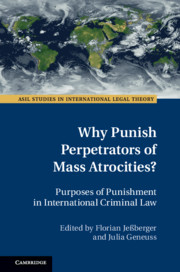Book contents
- Why Punish Perpetrators of Mass Atrocities?
- ASIL Studies in International Legal Theory
- Why Punish Perpetrators of Mass Atrocities?
- Copyright page
- Contents
- Contributors
- Preface
- Abbreviations
- 1 Introduction: The Need for a Robust and Consistent Theory of International Punishment
- 2 The Practical Importance of Theories of Punishment in International Criminal Law
- Part I Setting the Framework: Criminological, Historical and Domestic Perspectives
- 3 Criminology of International Crimes
- 4 Punishment Rationales in International Criminal Jurisprudence
- 5 Punishment and the Domestic Analogy
- 6 Not Much, but Better than Nothing – Purposes of Punishment in International Criminal Law
- 7 The Why Question in International Criminal Punishment – Framing the Landscapes of Asking
- 8 Is International Criminal Law Special?
- Part II Rationales for Punishment in International Criminal Law: Theoretical Perspectives
- Part III Consequences for the Practice of the International Criminal Court
- Select Bibliography
- Index
7 - The Why Question in International Criminal Punishment – Framing the Landscapes of Asking
A Comment on the Contributions by Frank Neubacher, Sergey Vasiliev and Elies van Sliedregt
from Part I - Setting the Framework: Criminological, Historical and Domestic Perspectives
Published online by Cambridge University Press: 07 February 2020
- Why Punish Perpetrators of Mass Atrocities?
- ASIL Studies in International Legal Theory
- Why Punish Perpetrators of Mass Atrocities?
- Copyright page
- Contents
- Contributors
- Preface
- Abbreviations
- 1 Introduction: The Need for a Robust and Consistent Theory of International Punishment
- 2 The Practical Importance of Theories of Punishment in International Criminal Law
- Part I Setting the Framework: Criminological, Historical and Domestic Perspectives
- 3 Criminology of International Crimes
- 4 Punishment Rationales in International Criminal Jurisprudence
- 5 Punishment and the Domestic Analogy
- 6 Not Much, but Better than Nothing – Purposes of Punishment in International Criminal Law
- 7 The Why Question in International Criminal Punishment – Framing the Landscapes of Asking
- 8 Is International Criminal Law Special?
- Part II Rationales for Punishment in International Criminal Law: Theoretical Perspectives
- Part III Consequences for the Practice of the International Criminal Court
- Select Bibliography
- Index
Summary
Referring to the title of the first part of this volume – ‘setting the framework’ – Immi Tallgren explains that there is not one framework in which the ‘why punish’ question can be asked. Instead different frames are required to draw attention to the plurality of perspectives that could be taken on international punishment. Thus, in her comment, Tallgren pictures the landscape in which ‘why punish’ is asked and thereby sheds light on the contexts of that context of knowledge, its production, reproduction and subjectivities. While sketching out these frames – the frame of law, the frame of criminology, the moral frame, the frame of ‘fantasmatic logic’ and the frame of politics – Tallgren makes visible the outside of the chapters ‘setting the framework’ and discusses what aspects of the ‘why punish’ question are missing in this volume, and whose voice is excluded from our debate.
Keywords
- Type
- Chapter
- Information
- Why Punish Perpetrators of Mass Atrocities?Purposes of Punishment in International Criminal Law, pp. 113 - 128Publisher: Cambridge University PressPrint publication year: 2020

